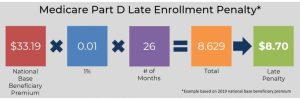A type of health insurance that an employer may offer to former workers is retiree insurance. Medicare almost usually outplays retiree insurance. This means that in order to have complete coverage, you must join Medicare. Once you become eligible for Medicare, certain retiree policies mandate that you enroll in Parts A and B.
Find Medicare Plans in 3 Easy Steps
We can help get up to $0 monthly premium Medicare plans
After you qualify for Medicare, you might be able to continue using your retiree insurance as your primary coverage if you:
- Acute Renal Failure (ESRD)
- You delay signing up for Part B of a Federal Employees Health Benefits (FEHB) plan, even though doing so could result in fees and coverage gaps if you decide to sign up for Medicare later.
If your retiree plan covers Medicare cost-sharing (deductibles, copayments, and coinsurances) and you can afford its premium, you might wish to maintain it. Find out if you can put off enrolling in Part D if the plan includes prescription drug coverage that you prefer. Find out if you can choose to keep only a portion of your plan (for example, just the health benefit or just the drug benefit) as well as what the expenses will be by speaking with your benefits administrator or your employer’s human resources department. You may not be able to discontinue your health insurance without also losing your prescription coverage under some policies, and vice versa. Also keep in mind that if you discontinue your retiree plan, your spouse and any dependents may require additional insurance as they are not qualified to use your Medicare coverage.
Find Medicare Plans in 3 Easy Steps
We can help get up to $0 monthly premium Medicare plans
Some employers offer Medicare Advantage Plans or group Medigap plans to their Medicare-eligible retirees in place of retiree insurance. Your Medicare and retiree health benefits are frequently combined under these plans. After you become Medicare-eligible, some companies require you to enroll in their Medicare Advantage Plan in order to keep your retiree health benefits. You can always decide not to enroll in your employer’s insurance and switch to Original Medicare or another Medicare Advantage Plan but bear in mind that you might lose your ability to reapply for retiree coverage in the future.
Contact the human resources division of your workplace or your benefits administrator for further details on how your retiree benefits work with Medicare.





